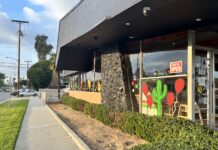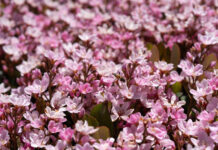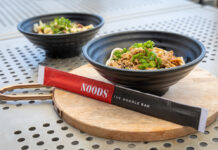A traditional Middle Eastern sobhaneh was a great wake up for Middle Eastern Week
By: Evan Ismail, SSW

Amanda Nguyen/HIGHLANDER
To begin the Middle Eastern Student Center’s (MESC) Middle Eastern Week, a traditional Middle Eastern breakfast, known as sobhaneh, was held in HUB 355 on Monday, April 17 from 10 a.m.-12 p.m. The breakfast also featured a performance by two men playing the oud, a stringed instrument common in the Middle Eastern world, as well as a goblet drum known as a tableh.
Desert Moon, the caterers for the event, provided a wide range of dining dining options for attendees including common foods like dolma (stuffed grape leaves), pita bread, hummus and the delicious pastry dessert — baklava.
The event also featured pictures of mosaics and landmarks of the Arab world including the beautiful Sheikh Zayed Mosque in Abu Dhabi, United Arab Emirates, the Sphinx in Egypt and the Arch of Triumph in Palmyra, Syria.
Fourth-year economics major Alexandra Artinian enjoyed the breakfast, sharing, “It was really great! I enjoyed the live music that set the atmosphere for the event. The food was delicious, definitely reminded me of home.”
Title: ME week’s poetry event promotes self-empowerment
Author: Nicholas Frakes, SW
The second event of the Middle Eastern Student Center’s (MESC) Middle Eastern Week 2017 took place on Monday, April 18 from 6-7:30 p.m. During the event, MESC held a Skype interview with the Canadian-Lebanese poet and teacher Najwa Zebian.
The interview started with Zebian reciting a poem that she read on International Women’s Day titled, “Who do you think you are?” which discussed the many stereotypes that surround Muslim women, why they are wrong and how best to respond to these stereotypes. Zebian described her feeling of homelessness after she left Lebanon and her connection with other refugees as inspiration for writing her poems and compiling them all into her first book. She also emphasized the importance of self-empowerment and being an individual rather than following what others say.
After Zebian finished her introduction, MESC Program Coordinator Natalie Haddad opened up the floor for questions. Zebian answered questions about who inspired her as a poet, her favorite poem and whether she would consider being political in some of her poems.
First-year chemistry major Tamara Mustafa described her feelings about the event, expressing, “I was expecting a lot of motivation and I feel like she did give (that) to all of us tonight.”
Title: UCR alumnus’ intro seminar for Arabic calligraphy
By: Erika Rico, CW

Thomas Holguin/HIGHLANDER
On Tuesday night in HUB 268, Faran Kharal, a UCR alumnus and calligraphy amateur (or so he says) gave a full room of eager learners a workshop on Arabic calligraphy. The group of around 30 was greeted with smiles and asked to help themselves to catered vegetable platters, various sandwiches and drinks.
Kharal began his lesson by showing the tools the audience would be using, such as the calligraphy pen made of wood, known as the Kamish pen. The first two rows of participants had to learn how to position the pen (the hollow center facing down and at a 45-degree angle) and re-dip their pen into the ink well after each stroke was made. The rest of the participants used an ink-ready pen and did not have to maintain a certain angle for the pen for the majority of the time. The participants spent the remainder of the night, learning how to write the Arabic alphabet in calligraphy. Kharal taught how to make certain lines and shapes with an overhead projector. The audience followed along with Kharal’s demonstrations, even going through the pronunciation of the letters of the Arabic alphabet when the next letter was introduced.
The night was filled with laughter while the audience tried to replicate each letter displayed and marveled at Kharal’s effortless lettering. Each attendee received a complimentary calligraphy pen to continue their skills. Kharal’s works can be viewed through his Instagram @faran_kharal.
MESC brings song and dance to ME week nooner
Author: Nicholas Frakes, SW
On Wednesday, April 19, from 12-1 p.m., the Middle Eastern Student Center (MESC) held their Middle Eastern Week nooner at the Bell Tower during, of which around 300 students attended.
Throughout the event, students could have henna drawn on their hands as well as visit the MESC table for more information on upcoming events or buy food from the Middle Eastern Student Association (MESA) tent.
The live performances started with an oud and tableh performance. Next a group of three professional bellydancers performed a short show. After the bellydancers concluded their performance, MESC Program Coordinator Natalie Haddad, had members of the audience perform their take on bellydancing for free T-shirts. The performances by the audience members brought the onlookers into a fit of laughter due to their simplicity as compared to the professional performers that preceded them.
The nooner ended with a dabke performance by the group Freedom Dabke. Once the group finished their performance, they taught members of the audience how to perform the basic steps of Palestinian dabke.
After the nooner concluded, fourth-year gender and sexualities studies major Tamara Hussein explained what she expected going into the nooner: “I just expected it to be super fun and everyone dancing. That is exactly what happened. It was really fun and everyone was dancing and it was just a healthy vibe. The campus felt really nice.”
Harrowing stories of immigration told by parents of MESC students
By: Evan Ismail, SSW
On Wednesday, April 19, students crowded into HUB 355 to hear immigrants from the Middle East and South Asia recount their extraordinary journeys from their home country to the United States in an event entitled, “Mama and Baba: Stories of Immigration.”
Natalie Haddad, program coordinator for the Middle Eastern Student Center (MESC) and the driving force behind M.E. Week, asked a series of 11 questions followed by an audience Q-and-A. The panel featured Eid Tabel from Palestine, Funda Ozdogan from Turkey, Amani Sedrak from Egypt, Hassan Salaheldine also from Palestine and Ejaz Ahmed from Bangladesh, all parents or grandparents of MESC students.
Salaheldine began with describing how he was born in a small village in Palestine without electricity or running water, mostly just consisting of small farms. He then went on to say that he graduated from a university. He explained that he was an “active student in university; I did some time in an Israeli jail, two years and a half” for, in his words, fighting for his freedom because of Israel’s occupation. He continued with the fact that he could not find a job with his time in prison, which was why he moved to the U.S.
Ozdogan then told her story of immigration, explaining that she grew up in a small town by a lake and then in a different town near the ocean. Though she looked back on her childhood with fondness, she described how her grandmother did not have a refrigerator, a television nor any other modern luxuries. She reminisced about her summers harvesting grapes to make and sell raisins on the family land. She came to the U.S. at age 12 to be with her father and marvelled at the diversity of food and appliances, like the refrigerator and the television.
Ahmed was next, beginning with how, in 1971, his father was killed (and his body never recovered) during the Bangladeshi genocide. His mother therefore had to raise him and his other siblings by herself while they lived in a concentration camp for five-and-a-half months. Later on in life, he went on to get a degree in business and was working several jobs to help his mother before immigrating to the U.S. with only two items in his pocket: “One is three hundred dollar only and one was the story of my mom.” He described how he passed on his story of the strength of his mother to his daughters throughout their lives.
Sedrak followed Ahmed by telling about how her, two sisters and her parents immigrated to the U.S. in 1973 when she was four years old with her father only carrying “a few dollars in his pocket.” She said that her father wanted to “open opportunities for us (his family) being that we had some family that immigrated here.” She explained that even though she grew up in the U.S., whenever she travelled back to Egypt, “I felt like it was home because that’s how we were raised.”
Lastly, Tabel told the tale of his life, also being born in a small village where he and his father worked as farmers, losing his father before he was born. He attended and finished school in his homeland but could not find a job after completion. He left then travelled to South America working as a salesman. He then received a visa for the U.S. where he worked in a factory before later opening his own store. He closed by expressing how thankful he is for immigrating into the United States and eventually finding a living to make his life comfortable.
MESC culture show connects generations, cultures through performance
By: Nicolai Bonca, CW
Middle Eastern Week’s final event, the MESC culture show, took place in HUB 302 on the evening of April 20. Presented in conjunction with the Empowered Arab Sisterhood — the United States’ first Arab sorority — the show featured multiple dance and musical performances, as well as a set by Egyptian-American stand-up comic Eman Morgan and a fashion show.
The show, which capped a week that MESC Director Tina Aoun characterized as a “huge tribute to our families who immigrated here,” drew an audience of about 200 that strained the venue’s considerable size. Composed largely of UCR’s Middle Eastern students with families in tow, the crowd of mothers, fathers and young siblings — “grandpas, even,” said Aoun — filled seats to watch traditional Afghan and Mexican dance (“We didn’t say just one culture!” an emcee quipped) and listen to performances by a 15-year-old Syrian singer named Dustin and an Egyptian oud player.
When New Jersey’s Freedom Dabke Group mounted the stage, the event’s final and most rousing portion began. The group’s concussive performance — dabke, a folk line dance, features conspicuous, lively stomping — seemed to carry into the fashion show that followed: Students dressed in bright, flowing traditional garb strutted the stage to a bass-heavy soundtrack and cheers from the crowd.
After the fashion show, the DJ called on everyone to dance, and nearly the entire audience obliged. The stage was soon packed with dancers old and young, student beside parent, and the rest of the crowd linked arms to form an enormous moving ring that ran along the room’s walls. The Freedom Dabke Group returned out of costume to join in, friends mounted each others’ shoulders and elderly women clasped hands with their grandchildren, smiling and moving their feet with familiar confidence.
MESC Program Coordinator Natalie Haddad speaks about the importance of M.E. Week
By: Evan Ismail, SSW
In the middle of the hustle and bustle of M.E. Week, The Highlander sat down with Middle Eastern Student Center (MESC) Program Coordinator Natalie Haddad to discuss their work putting on M.E. Week.
To begin, Haddad discussed the organization’s goals in putting on M.E. Week, saying “one of our biggest goals is to educate the community, not only at UCR but also the bigger community as well, on Middle Eastern culture, on Middle Eastern history, on Middle Eastern news, on Middle Eastern people.”
Haddad went on to say that for her personally, she wants to show the community the side of Middle Eastern culture that is exciting, lively and authentic since, usually when people hear “Middle East,” the last thing they think is “dabke, dancing or having fun or food. They always think of politics, religion, war and that is so sad.” Haddad described how showing the broader community something as basic as food may change their mind when they hear “Middle East,” perhaps associating it with the food they tried during M.E. Week. “This aspect of Middle Eastern culture that really gets overshadowed and exoticised,” said Haddad speaking of art and food from the Near East. “I wanted to bring it to Earth.”
Islamophobia is alive, it’s well, it’s thriving but what can we do to take away from that? Meet people. Come into the center. Come to these events.
In light of the recent political climate where immigrants, and Muslims, may be looked upon with skepticism, Haddad expressed her desire to change that prejudice through events like M.E. Week, stating, “Islamophobia is alive, it’s well, it’s thriving but what can we do to take away from that? Meet people. Come into the center. Come to these events.” Haddad explained how important it is to expose the larger community to Middle Eastern culture in order to break down the stigma and popular resignation associated with the Middle East. “We want to say ‘Look, we know you have resignations but we are going to show you that your resignations are not grounded in anything’ … so what we can do is we can show you, we can educate you, we can open your eyes.”
When asked if they were thinking ahead for next year’s M.E. Week, which will be their fifth anniversary, Haddad explained that they were keeping, and hopefully enlarging, the dancing aspect like Freedom Dabke Group, who performed at the nooner and culture show. In upcoming events, MESC will be hosting a self-care session in partnership with The Well that will feature calligraphy, a midterm de-stresser at the UCR Botanic Gardens and Iftar, which is the evening meal to break the daily fasts, to celebrate Ramadan with the Muslim Student Association.
MESC can be followed on Facebook at Middle Eastern Student Center – MESC, YouTube under MESC at UCR, and Instagram Tumblr, Twitter and Snapchat under @mescucr.








